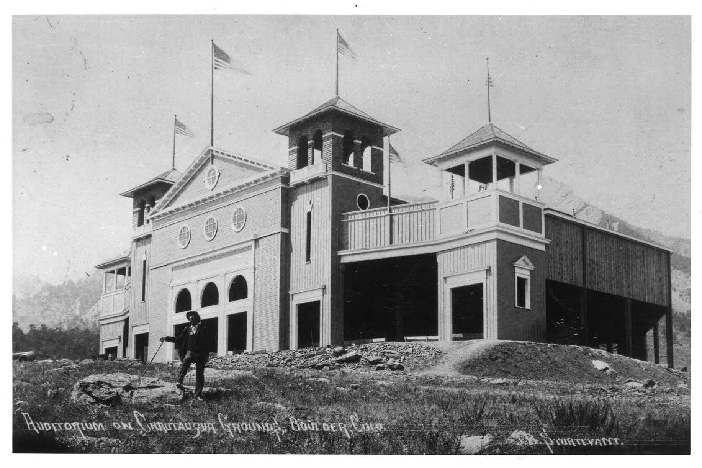Lodging Special:
Chautauqua Winter Wonderland – Save 15%
- Pet-friendly lodging options
- Flatirons hiking and snowshoeing
- Dining and concerts


Doors: 5:30
Event time: 6:00

The Maestas Case is the earliest known successful struggle by Mexican-American to end school segregation in the United States. All but forgotten for over a century, the lawsuit was filed in 1913 and took place in southern Colorado, a region of deep historical roots for Hispanics.
This three part presentation will be in a panel format with Retired Judge Martín Gonzales setting the case in its unique historical context and legal background. Dr. Gonzalo Guzmán will talk about Perspectives on Pride and Persistence in Ending Public School Segregation and other examples of Latino educational segregation. Dr. Antonio Esquibel will talk about the Sociedad Protección Mutua de Trabajadores Unidos’ (SPMDTU) involvement in the case and will perform “El Corrido de Francisco Maestas”.
A segregated school for Mexican-American Children was created with All Mexican-American children regardless of English proficiency required to attend. The plaintiffs (Mexican-Americans) argued their children were racially distinct as Mexicans and that this was prohibited under the Colorado Constitution as improper public schools segregation of children based on color and race. Defendants (school board members and the superintendent) countered that these children were Caucasian and no different from other White children in the school district. Further that the Mexican-American children were segregated to meet their linguistic needs.
District Court Judge, Charles Holbrook, ruled in 1914 that to the extent that many Mexican-American children were English speaking, the segregation of English language proficient Mexican-American children was improper and they had the right to their chosen School.
Dr. Gonzalo Guzmán:
Dr. Gonzalo Guzmán is from Wapato in the Yakima Valley of Washington State. He is an assistant professor of educational studies at Macalester College in Saint Paul, Minnesota. His research focuses on the racialization and educational histories of Latina/o/x communities in the Mountain States and Pacific Northwest of the US. His work has been published in the Journal of Latinos and Education, History of Education Quarterly, Education’s Histories, Critical Readings on Latinos and Education, and Annals of Wyoming. Additionally, his research and commentary has been featured in Colorado, Washington, and Wyoming NPR and PBS affiliate stations, as well as the National Park Service. He is currently finalizing his first book manuscript tentatively titled: Education for a New Race: Making Whites and Schooling the Mexican in Greater Juan Crow. Guzmán’s research led to the rediscovery of the Maestas case.
Dr. Antonio Esquibel:
Dr. Antonio Esquibel has been a member of the La Sociedad Protección Mutua de Trabajadores Unidos (SPMDTU), the oldest civil rights organization in the United States, for 55 years. He is currently the Secretary of the Concilio Superior, its governing board. The SPMDTU was founded in 1900, 123 years ago in Antonito, Colorado. He represents the SPMDTU on the Maestas Case Commemoration Committee. He has composed “El Corrido de Francisco Maestas”/”The Ballad of Francisco Maestas”, which immortalizes the case. Dr. Esquibel is an Emeritus Professor of Spanish, former Vice President of Student Affairs and former Trustee of Metropolitan State University of Denver.
Judge Martin A. Gonzales:
Judge Gonzales is a fourth-generation resident of the San Luis Valley. He obtained his JD from the University of Colorado Law School in 1978. He engaged in an extensive private civil practice his appointment to the bench. He was the first Hispanic County Judge for Alamosa County, Colorado. Appointed in in 2007 He became the first Hispanic District Court Judge for the 12th Judicial District which encompasses the whole of the San Luis Valley. His position as District Court judge makes him a successor judge to Judge Holbrook, who issued the order in the Maestas Case. He is now retired and with the Senior Judge program for the Judicial Branch. He is the chairperson of the Maestas Case Commemoration Committee and a member of the Colorado Council on Restorative justice.
This program is supported with funding from the generous bequest of Betsy Hitchcock.

Doors: 5:00 PM
Show: 5:30 PM

Celebration of a Chautauqua Legend and a Tour of Her Historic Cottage
Chautauqua’s own historic trailblazer, Theodosia Ammons, will be inducted into the Colorado Women’s Hall of Fame this spring. Born in 1861, Ammons broke barriers as the first female dean at what is now Colorado State University, president of the Colorado Equal Suffrage Association, national leader in developing the academic field of domestic sciences, and director of Chautauqua’s original continuing education school for teachers.
Theodosia Ammons was the founding principal of Chautauqua’s School of Domestic Science. Domestic Science, also known as home economics, was a progressive field that brought science into the home, ushered women into higher education and provided leadership opportunities in education, government and business. In 1895, Ammons co-founded the Colorado Agricultural College (now Colorado State University) Department of Domestic Economy. A few years later in 1898, Ammons was picked to head up the faculty of Chautauqua’s domestic science department. In 1900, Ammons’ expertise in all things domestic led her to design a model vacation cottage on the Chautauqua grounds. Every detail for health, sanitation, comfort and convenience was accounted for in the plans. Named Gwenthean Cottage, for sisters Gwendolin, Theodosia and Anne, the model home remains in the family and is virtually unchanged from the original design.
Sharing the stage to celebrate Ammons’ induction will be Carol Taylor, local historian and researcher, and Catherine Long Gates, Ammons’ great niece and third generation owner of Boulder’s iconic Long’s Gardens. Carol will set the historical context for Ammons’ life by describing events of the country’s Progressive Era, a transformational period of social activism and political reform. Catherine will trace Ammons’ journey through that Era highlighting the adult education program Ammons pioneered at Chautauqua. Following the program and discussion, Catherine and her family will provide a rare opportunity for the audience to tour Gwenthean Cottage. Designed and built by Ammons in 1899 to showcase innovations for making women’s domestic work more efficient, the cottage has been preserved in close to its original state and truly takes the visitor back in time.
Carol Taylor is a researcher and writer who has held positions with several local history organizations. Her history columns have appeared in the Daily Camera newspaper for over 20 years. Currently Taylor is researching the histories of four privately-owned ranches in Colorado and Wyoming.
Catherine Long Gates is Theodosia Ammons’ great niece and third-generation owner of Boulder’s iconic Long’s Gardens, now permanently protected for community horticultural and agricultural uses thanks to the support of the community and the Long family’s efforts. A Colorado native, Catherine is co-owner with her sister, Margaret, of Gwenthean Cottage.



Doors: 7:30 PM
Showtime: 8:00 PM
The blend of Bill & Jilian Nershi’s harmonies and driving acoustic guitar immediately draw in the listener. An inspired journey through different styles and influences, a throwback to the roots of American music, the Nershis have a relaxed way of connecting with the audience through the stories in their songs. Constantly finding ways to make the music sound complete as a duo, unique arrangements and a deep catalogue of original songs highlight the couple’s dedication to their craft.
The couple met back in 1990 when Jilian was a performer during Bill’s open mic night at the Floradora Saloon in Telluride, Colorado. In the 30 years since, Bill has gone from the front bench of the Floradora Saloon, to Colorado’s premier outdoor venue, Red Rocks Amphitheater, with his band The String Cheese Incident. The Nershis have continued to write songs together, several of which have been recorded by The String Cheese Incident and become staples in the band’s live performances. Jilian was featured on SCI’s album Beautiful on the song “Down A River” that she and Bill created.
In 2004, Bill and Jilian formed the band Honkytonk Homeslice with friend and guitar virtuoso Scott Law. The group hosted festivals in Colorado and Costa Rica, plus ski events in Utah and Wyoming, while touring nationally and internationally swearing, “if it ain’t fun, we ain’t doing it.” The Nershis also created a recording studio, “The Sleeping Giant,” outside of Nederland, Colorado, where they recorded the self-titled Honkytonk Homeslice album as well as Just Passin’ Thru, featuring the title track co-written with John Perry Barlow, of Grateful Dead fame, who was a guest at the studio. “We had a great time hanging out with John. We really hit it off as a writing team.”
All the while, the couple has played many private and public events bringing awareness to educational and musical causes such as Take Note Colorado. The two have also become proud ambassadors for the international music program Innovative Giving Enhancement, where they enjoy creating music, the universal language, with friends old and new.